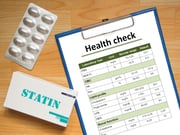Taking Statins After 'Bleeding' Stroke Could Help Prevent Another Stroke
By Cara Murez HealthDay Reporter
THURSDAY, Aug. 31, 2023 (HealthDay News) -- Taking cholesterol-lowering statin medication after a bleeding stroke, or intracerebral hemorrhage, may lower the risk of a subsequent stroke caused by a blood clot, according to new research.
“Previous research has had mixed results on the risk of stroke in people who are taking statins and have already had a bleeding stroke, so we evaluated this further,” said study author Dr. David Gaist, of the University of Southern Denmark in Odense and a member of the American Academy of Neurology.
“We looked at whether use of statins after a bleeding stroke is associated with the risk of any additional stroke, including both those caused by bleeding and by blood clots," Gaist said in an academy new release. "We found that those who used statins had a lower risk of stroke, notably ischemic stroke, while there was no change in the risk of bleeding stroke."
While intracerebral hemorrhage is caused by bleeding in the brain, ischemic stroke is caused by a blockage of blood flow to the brain. Ischemic strokes are by far the most common types of stroke.
Researchers studied health records in Denmark, finding more than 15,000 people who had a first bleeding stroke.
They followed the patients from 30 days after their bleeding stroke until the occurrence of another stroke, death or the end of follow-up, which on average lasted 3.3 years. The research team used prescription data to determine information on use of statins such as atorvastatin and simvastatin.
The authors then did a number of comparisons.
First, they compared more than 1,900 people who had another stroke to 7,400 people who did not have another stroke.
About 39% who had another stroke took statins compared to 41% of those who did not have a second stroke.
Statin use was associated with a 12% lower risk of another stroke after the authors made adjustments for high blood pressure, diabetes and alcohol use.
The authors then compared more than 1,000 people who had an ischemic stroke to more than 4,000 people who did not have another stroke. About 40% of those who had a stroke took statins compared to 42% of those who did not have another stroke.
Statin use was associated with a 21% lower risk of an ischemic stroke after the initial bleeding stroke.
In yet another comparison, nearly 1,000 people who had another bleeding stroke were compared to more than 3,700 people who did not have another stroke. Of those who had a recurrent bleeding stroke, 39% took statins compared to 41% of those who did not have another stroke.
After adjustments, in that analysis researchers did not find a link between statin use and recurrent bleeding stroke.
“The results of our study are good news for people taking statins who have had a bleeding stroke,” Gaist added. “While we did find a lower risk of having another stroke, it is important to note that when looking at the data more closely, that lower risk was for ischemic stroke. Still, we found no increased risk for bleeding stroke. More studies are needed to confirm our findings."
Study limitations include that the research only included the Danish population. It may not be able to be generalized to others.
The findings were published online Aug. 30 in Neurology.
More information
The American Stroke Association has more on ischemic stroke.
SOURCE: American Academy of Neurology, news release, Aug. 30, 2023

The news stories provided in Health News and our Health-E News Newsletter are a service of the nationally syndicated HealthDay® news and information company. Stories refer to national trends and breaking health news, and are not necessarily indicative of or always supported by our facility and providers. This information is provided for informational and educational purposes only, and is not intended to be a substitute for medical advice, diagnosis, or treatment.

